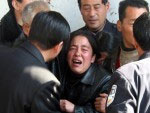




HONG KONG -- China's coal-mining industry is considered one of the most dangerous in the world. Chinese officials say roughly 7,000 workers are killed annually, but international rights groups say the number may be as high as 20,000.
In a series of in-depth interviews with RFA's Mandarin service, industrial safety experts, miners' families and government officials all blamed human factors for the huge loss of life in China's coalmines.
"One hundred percent of the mining accidents that take place are accidents where there is responsibility," industrial safety specialist Tang Chun of the officially sanctioned All China Federation of Trade Unions told RFA.
"They all happen because the national safety regulations have not been followed properly, or have been breached entirely. Not a single one is the cause of natural or unavoidable circumstances," Tang said.
Luo Yun, director of the School of Engineering Technology at the China University of Geosciences, agreed: "The reason for the accidents is a human factor, either poor management, or a failure to conduct rigorous safety inspections... There are rules and laws but they are not implemented."
"All of these accidents are caused by human error, and they are all controllable and avoidable."
"All of these accidents are caused by human error, and they are all controllable and avoidable," Luo told RFA.
Mining families across the country — ; many of whom have lost their main breadwinner in underground disasters — ; echoed Luo's view.
"It was a gas explosion. It happened because they didn't pay attention to safety," the relative of a peasant miner in the eastern province of Jiangxi told RFA, following a blast that killed 48 people in November 2003.
"This mine is very productive. There's a lot of coal down there. The bosses didn't really think about the safety of the workforce. The more the mine produced, the more they made in salary and bonuses," the Fengcheng resident said.
In what is described as the fourth deadliest mining disaster in China's history, a gas explosion at the Chengzihe coal mine in Jixi in September 2002 left at least 111 miners dead.
"My husband's name was Li Huitan...Our whole family depended on his labor. Now he's gone, there's nobody to take care of us...This is a tragedy caused by human beings."
"My husband's name was Li Huitan," one Chengzihe widow told RFA reporter Han Dongfang. "Our whole family depended on his labor. Now he's gone, there's nobody to take care of us.... This is a tragedy caused by human beings."
China's coal mines meet 70 percent of the booming economy's energy needs, but coal production comes at a heavy price. In the first six months this year alone, 3,758 people died in mining accidents, according to State Administration of Workplace Safety (SAWS) figures.
Government officials are aware that China must solve its mining-accident problems, that the country's economic development must not be at the expense of human life and that much of China's coal has blood on it.
But they appear to be locked into a system where poverty and a lack of effective checks and balances conspire to put profit and energy needs above safety concerns. Rampant official corruption ensures that central government initiatives never get at the root of the problem, according to Chinese labor activists.
"The government has no way of knowing what really goes on in the mines," Beijing-based labor activist Zhou Guoqiang told RFA in a recent panel discussion. "It's very complicated. One factor is that often the safety inspection officials actually never get to find out the real situation. Another is a question of bribery."
France-based labor activist Cai Chongguo agreed that central government was failing to attack the problem at its roots. "They rely on the regional safety inspection offices. But they really must start to rely on the workers and labor unions to carry out a bottom-up supervisory function."
Many fatal accidents are simply not reported, and there are too few safety inspection officials to cover the thousands of small and medium-sized coalmines which have mushroomed across the country as coal prices soar.
Corruption at every level compounds the problems. "At a mine in Yunnan province where there was a gas explosion on Sept. 20, we learned from local sources, that when the safety inspection officials went to the mine before the explosion, they simply had a big meal, gambled and drank together with local officials and went away again," Cai told RFA.
"And when the reporters went to cover the explosion, they were given bribes by the local mine bosses and government officials, and they went away again. So supervision by the media isn't working, and supervision by SAPS officials isn't working either," he said.
In the past, China's mines were worked by lifelong professional miners on a permanent "iron rice-bowl" contract with state-owned enterprises. Nowadays, the state will lease mines to private or semi-private mining enterprises who employ unskilled and desperate peasant contract laborers, most of whom are not even members of the official trade union. Unofficial labor unions are forbidden in China, and labor activists are often sentenced to jail on subversion charges.
"You can't just refuse to go down there," Zhou said. "You have to be organized. But the central government won't allow you to organize. So what are you going to do?"
Many of those who die in China's mines are peasant workers who have had their land taken away, often by the mining company itself, and face destitution.
The current typical mining wage of 1,000 yuan (U.S.$120) a month is a lifeline. "They're afraid that if they refuse to go down the pit that they'll get fired and lose their livelihood," Cai said. "They'll accept almost any conditions because of this. It's a tragic situation."